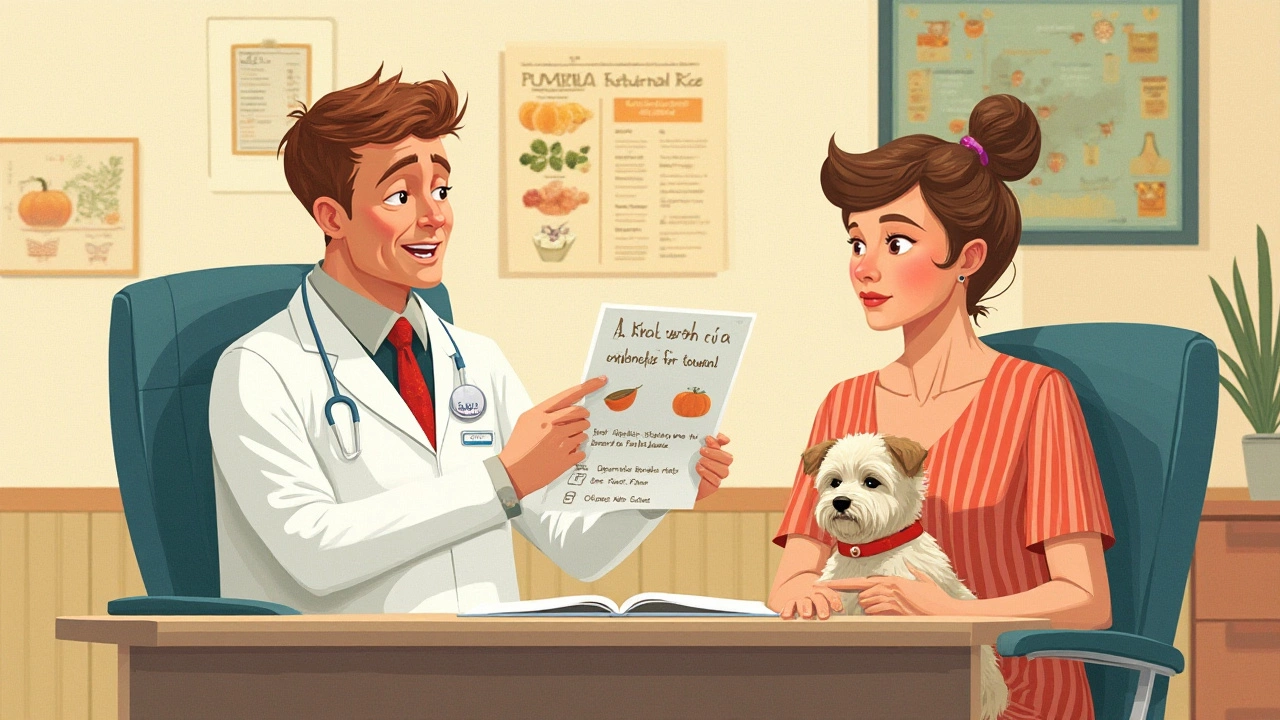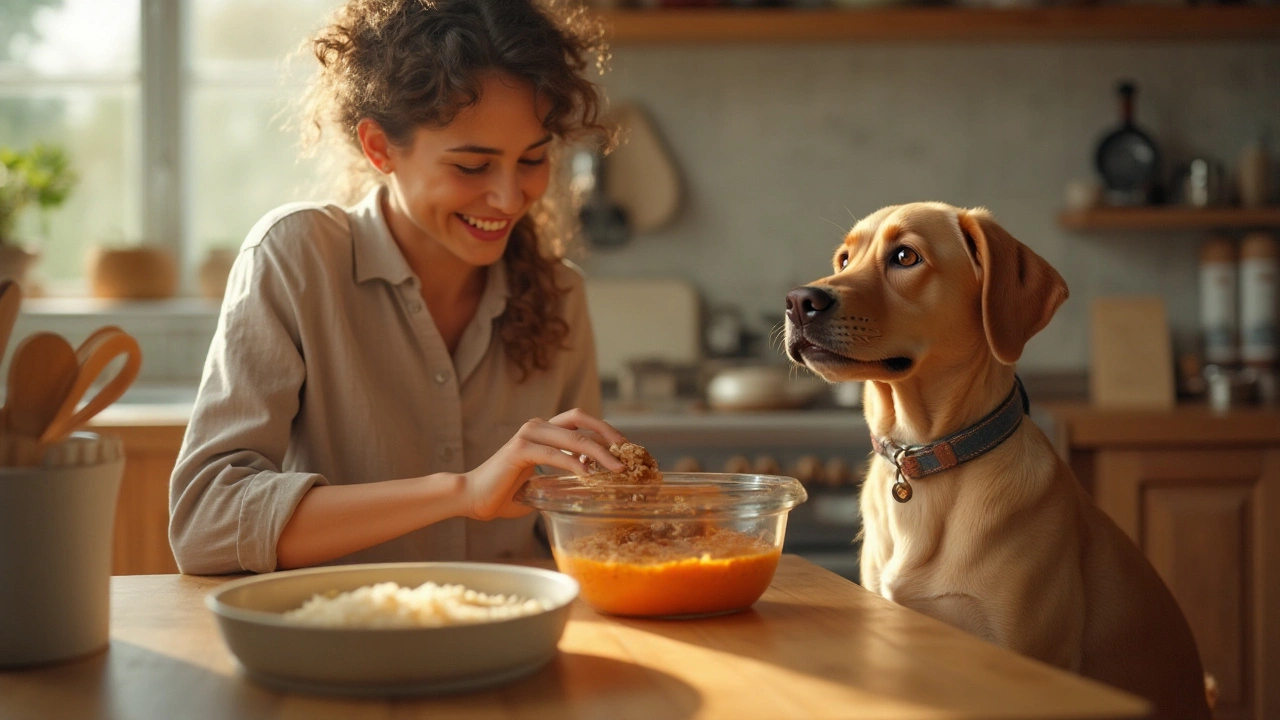When our loyal companions aren't feeling their best, it pains us deeply as caretakers and friends. Diarrhea in dogs may be a common issue, but it's certainly not pleasant for them or us. Many a pet owner has puzzled over the best way to ease their dog's discomfort, often reaching for familiar comforts like pumpkin or rice.
In this exploration, we'll dive into the particular qualities of these two popular remedies. Both boast unique properties that can help solidify your pup's stools. We will look into why these ingredients are often recommended and break down the reasons you might choose one over the other.
Part of being a great dog owner is knowing when to intervene and understanding how these simple foods can help. So, let's embark on this journey together, ensuring that the next time your furry friend faces an upset tummy, you'll be ready with a gentle, informed approach.
- Understanding Canine Diarrhea
- Benefits of Pumpkin for Dogs
- Benefits of Rice for Dogs
- When to Use Pumpkin or Rice
- How to Prepare Pumpkin and Rice
- Tips for Managing Dog Diarrhea
Understanding Canine Diarrhea
Diarrhea in dogs is a common condition that nearly every canine owner will encounter at some point. It's characterized by frequent passage of loose or liquid stools and can vary in severity from a minor, transient issue to a serious problem that requires veterinary intervention. There are myriad causes behind why your dog might be experiencing digestive distress. These can range from simple dietary indiscretions, such as eating spoiled food or a sudden change in diet, to more complex health issues like infections, parasitic infestations, or even underlying systemic diseases. Regardless of the cause, diarrhea is a way for the body to expel things that it doesn't agree with, sometimes too efficiently, which can lead to dehydration.
In situations where diarrhea persists for more than a couple of days, or if it's accompanied by symptoms such as fever, vomiting, lethargy, or loss of appetite, it's crucial to consult with a veterinarian. While many cases of canine diarrhea resolve without intervention, chronic issues may signal something more serious. It's fascinating to note that, according to the American Veterinary Medical Association, gastrointestinal issues account for about 10% of all veterinary visits, indicating just how frequently our dogs suffer from such problems. Prevention, therefore, becomes essential in maintaining overall health and well-being.
Understanding the consistency, color, and frequency of the stool can offer insights into the underlying causes. For instance, yellow diarrhea often suggests a rapid transit time, causing bile to color the feces, whereas black or red stools can indicate bleeding in different parts of the digestive tract. It's a good practice to monitor your dog’s bathroom habits closely to catch any abnormalities early. Several pet owners find it helpful to keep a diary of their pets’ symptoms and occurrences, which makes providing accurate details to the vet significantly easier.
Addressing the nutritional aspect, both Pumpkin for dogs and rice for dogs have become go-to home remedies for managing mild cases of diarrhea. They both provide different benefits yet share the same goal of helping solidify the stool consistency. While pondering which option might work best for your furry friend, it's useful to educate ourselves on what exactly composes each food's nutritional profile and how it reacts with a dog’s digestive system. Remember, enhancing our understanding of what's normal and what's not is the first step to catching issues early and keeping our dogs healthy.
"The frequency and duration of diarrhea can serve as a window into a dog's overall health. A single episode of diarrhea generally isn’t a cause for alarm, but recurrent issues can indicate a more serious issue," advises Dr. Jane Dobson, renowned veterinary specialist and researcher.
Finally, ensuring a balanced diet and regular vet check-ups can aid in preventing the occurrence of diarrhea. As proactive measures, incorporating high-quality food, maintaining hydration, and paying heed to your dog's everyday activities are monumental. While the odd upset stomach is normal, understanding when it becomes a concern is vital to being an attentive and responsible pet owner.
Benefits of Pumpkin for Dogs
Pumpkin is more than just a fall seasonal delight; it's a powerhouse of nutrients that can be a boon for your dog's digestion. This bright orange fruit is rich in fiber, which is vital in adding bulk to your pet's stool. The fiber contained in pumpkin aids in the absorption of excess water in the digestive tract, thereby firming up loose stools. It's a natural way to help your dog when they’re experiencing bouts of diarrhea. Anytime Gideon, my adventurous pup, had a bit too much fun at the park and ended up with an upset stomach, a spoonful of pumpkin always seemed to work wonders.
Nutritionally speaking, pumpkin is packed with essential vitamins such as A, C, and E, not to mention minerals like potassium and iron. These nutrients aren't just integral for combating diarrhea; they also support your dog's overall health. For instance, Vitamin A is beneficial for vision and immune function, which can be quite helpful during recovery from digestive issues. Adding pumpkin to your dog's diet may seem simple, but its health benefits are manifold, from complementing their regular food intake to instilling a sense of well-being. According to Dr. Karen Becker, a well-regarded integrative wellness veterinarian, "Pumpkin is an excellent source of fiber that's safe for dogs, and many relish its flavor." This endorsement highlights that not only is pumpkin healthy, but it's also something dogs enjoy eating.
With its antioxidant properties, pumpkin can help reduce inflammation in your dog's digestive system. The seeds, although often overlooked, bring their own set of advantages, as they are parasiticides, meaning they can help in getting rid of intestinal worms. Of course, when preparing pumpkin for your dog, it's important to stick to plain, canned pumpkin without added sugars or spices that could complicate their stomach issues. When you think about it, offering your dog a spoonful of pumpkin is a small gesture that can yield tremendous benefits.
Using pumpkin may be particularly advantageous for dogs with dietary sensitivities. Unlike some grains like wheat, pumpkin is less likely to cause an allergic reaction. It's a low-calorie, low-fat ingredient, which makes it an excellent choice for weight-conscious or sensitive dogs. The efficacy of pumpkin doesn’t end at diarrhea; it contributes positively to healthy weight management, skin and coat condition, and even urinary tract health. All these aspects combined make pumpkin an admirable option in the *dog health* repertoire.

Benefits of Rice for Dogs
Rice has been a staple in various cultures around the world, not only for human consumption but also as a trusted remedy for various pet ailments, including dog diarrhea remedy. When a dog experiences gastrointestinal distress, offering bland, easily digestible foods is a time-tested approach. White rice, in particular, stands out because it is gentle on the stomach and helps firm up loose stools. Its low fiber content ensures that it doesn't aggravate the digestive system, making it a suitable option when your furry friend has an upset stomach.
While brown rice often holds more nutrients, its higher fiber can sometimes be a bit much for sensitive tummies. White rice, on the other hand, serves the specific purpose of reducing fluidity in the digestive tract, which stems from its ability to absorb extra moisture. This absorption also assists in preventing dehydration, a vital consideration when dealing with diarrhea. Since the body's fluids are being lost more rapidly, having a food that retains fluids can significantly help in balancing the dog's intake and output.
Nutritionally, rice provides an energy boost through carbohydrates, which are crucial, especially when the dog may not be eating much else during recovery. Rice also contains some essential vitamins and minerals such as niacin and vitamin D, although in small quantities. These help in maintaining energy levels and ensuring smooth metabolic functions. However, it should be noted that rice should not become a permanent replacement for a well-balanced diet tailored to a dog's specific nutritional needs.
Many veterinarians advocate using rice as part of a bland diet, typically combined with boiled chicken. Dr. Sheila McCullough, an esteemed veterinarian, suggests, "Rice serves as a temporary aid, but it can support the system's return to normalcy, providing the body a chance to heal while offering nourishment."
"In acute conditions, a bland diet helps the stomach reset. Mixing rice with easily digestible protein gives the body what it needs without overloading digestion." - Dr. Sheila McCullough
Preparation of rice is simple: it's boiled with plenty of water until it is very soft, making it easy for dogs to digest. No seasonings should be added as extra flavors might upset the dog's stomach further. It's crucial to serve it plain, allowing its natural properties to aid recovery. In cases where rice doesn't seem to help or symptoms persist beyond a day or two, contacting a vet is strongly advised, as the symptoms can indicate a more serious issue at play.
As we consider rice for dogs as a solution, it highlights the importance of understanding tailored responses to our pet's health needs. By integrating rice appropriately at the right times, it offers a simple, home-based method to tackle troubling symptoms effectively while awaiting professional diagnosis if necessary. This ancient grain's role in a dog's temporary diet underscores its timeless value and versatility in health management.
When to Use Pumpkin or Rice
Dogs, much like their human counterparts, can face digestive disruptions now and then. Deciding whether to use pumpkin or rice for your dog's diarrhea hinges on understanding the nature of the issue, your dog’s specific needs, and each ingredient’s particular benefits. Pumpkin is widely cherished for its rich fiber content and soothing properties. If your dog's digestive upset is due to intolerance or reaction to certain foods, pumpkin's high soluble fiber content can help by absorbing excess water in the digestive tract. This fiber not only aids in firming up stools but also provides nourishment with vitamins A, C, and E, alongside potassium and iron.
On the other hand, rice, particularly the white variety, is bland, easy to digest, and helps bind stools. It's best suited when the diarrhea might be triggered by an abrupt change in diet or minor gastrointestinal distress. Being low in fiber compared to brown rice, it won’t aggravate your dog’s stomach further, but instead, will offer a mild, filling meal. If your dog is also battling nausea, rice's binding nature may help calm those waves of discomfort. It provides carbohydrates that are essential for energy recovery while being gentle on the stomach lining. Consider your dog's preferences and past reactions to these foods, as that also plays a crucial role in decision-making.
“The right kind of diet or inclusion of homely remedies like pumpkin or rice can make the treatment of acute gastrointestinal distress in dogs much more manageable,” says Dr. Julie Buzby, a prominent veterinarian.
Aside from the nature of the diarrhea, the dog's taste can determine which remedy they'll accept more readily. While most dogs tend to enjoy the naturally slightly sweet taste of pumpkin, others might prefer the neutrality of rice. Both options can be served alone or alongside boiled chicken or turkey, which can add a bit of protein without unsettling the tummy further. Remember, moderation is key. When implementing dietary changes, these foods should not overshadow the dog's regular intake, but serve as short-term solutions to temporarily aid interrupted digestion.
Bear in mind the importance of consulting your vet if diarrhea persists for more than a day or involves worrying symptoms like lethargy, dehydration, or blood in the stool. In some cases, other interventions might be necessary, and professional guidance can prevent complications. Monitoring how your furry friend responds to these home remedies also offers valuable insights into managing future instances. The valuable peace of mind knowing you have effective and friendly remedies at hand is worth acknowledging, and a sign of attentive pet care.

How to Prepare Pumpkin and Rice
Feeding your dog pumpkin and rice might sound like you’re preparing a delightful seasonal dish, but these two ingredients, when prepared correctly, can work wonders for a dog dealing with diarrhea. Pumpkin is celebrated for its rich fiber content which aids in digestive health and bulking up stools. Rice, particularly the plain white variety, is gentle on a dog's tummy, easy to digest, and provides essential nutrients that help firm up loose stools. Let's explore the best ways to prepare these comforting remedies to ensure optimal benefits.
Preparing Pumpkin for Your Dog
To prepare pumpkin for your dog, fresh or canned pumpkin can be used, but it’s crucial to choose plain, unsweetened varieties without additives or spices. Many canned options in stores are already pureed, cutting down on prep time, yet offering rich nutrients. If you prefer using fresh pumpkin, start by selecting a small sugar pumpkin, which is typically the sweetest and easiest to cook.
- Begin by slicing the pumpkin in half and scooping out all the seeds and stringy bits. Remember, the seeds can also be roasted and saved as healthy treats, but that's a topic for another day.
- Once cleaned, cut the pumpkin into manageable chunks and remove the skin carefully using a sharp knife or a peeler.
- Place the chunks in a pot of water and bring it to a boil, then let them simmer until the pumpkin flesh is tender.
- After cooking, drain the water and mash the pumpkin using a fork or food processor to create a smooth puree. The texture should be silky, ensuring your dog enjoys every bite without choking hazards.
- Store the puree in an airtight container in the refrigerator if not used immediately, and always check it’s fresh before serving. It's best to introduce this puree gradually into your dog’s diet to avoid any upset from change.
"Pumpkin is one of the healthiest things you can give your pet," says the American Kennel Club. "Fiber-rich fruits like pumpkin not only help regulate sensitive stomachs but also support overall gut health."
Preparing Rice for Your Dog
When preparing rice, plain white rice is preferred for dogs suffering from diarrhea. While brown rice is nutritionally richer, it's harder to digest and might not be ideal when your dog's stomach is upset. The simplicity of white rice means you can focus directly on helping them recover faster. To prepare it, follow these steps:
- First, rinse one cup of uncooked white rice thoroughly under cold water to remove any excess starch. This helps ensure the grains don’t stick together and stay fluffy when cooked.
- Combine two parts water to one part rice in a pot and bring it to a boil. Once boiling, reduce the heat to a simmer and cover it with a lid.
- Allow the rice to cook on low heat for about 15-20 minutes or until the water has been completely absorbed and the rice is soft.
- Remove the pot from the heat and let it sit covered for an additional five minutes. This resting period allows the rice to finish steaming and reach the right chewable texture.
- Fluff the rice with a fork before serving it to your dog. Consider mixing it with some pumpkin puree for enhanced flavor and greater health benefits.
By knowing the correct ways to prepare these remedies, you ensure your dog receives the full benefits of pumpkin and rice. These simple dietary adjustments often represent the first step toward helping your furry friend return to wagging their tail with enthusiasm and comfort.
Tips for Managing Dog Diarrhea
Dealing with dog diarrhea can feel like a daunting task, especially when you just want to ensure your furry companion's well-being. With the right approach, however, it can be managed effectively without too much stress. First, it’s crucial to keep a keen eye on your dog's overall health condition. Monitor any additional symptoms such as vomiting, lethargy, or fever. Should these arise, it may be time to consult a veterinarian. Hydration is key during episodes of diarrhea, as the loss of fluids can quickly lead to dehydration. Ensure that your dog has constant access to fresh water, and consider offering a rehydrating solution formulated for pets if necessary.
"According to Dr. Karen Becker, keeping a simple and bland diet is essential when your pup has a tummy upset."
When facing a bout of diarrhea, it's best to give your dog’s digestive system a break. Start with a fasting period of 12 to 24 hours, depending on your veterinarian's advice, during which you only provide water. Following this, reintroduce food with a bland diet that is gentle on the stomach. Foods like boiled white rice or pumpkin can aid in normalizing stool consistency. These foods are not just gentle; they contain natural fibers that can benefit your dog's gut health. Remember, introducing new foods should be gradual. Begin with small portions and gradually increase to avoid further digestive distress.
Watch for any signs of improvement within a day or two. If your dog's condition doesn’t improve, or if it worsens, it's essential to seek veterinary advice, as persistent diarrhea can be a sign of underlying health issues. Additionally, prevent access to garbage or spoiled food, and limit table scraps, as these are often culprits for causing upset digestion in dogs. Engaging your dog in regular physical activity can also promote healthy digestion and overall well-being.
A good habit to cultivate is maintaining a regular feeding schedule. Feeding at the same times daily helps in regulating your dog's digestive system. Ensure that your dog is on a balanced diet that meets all their nutritional needs to strengthen their immune system and aid in preventing future occurrences. Always consider using probiotics or digestive supplements designed for dogs to help maintain a healthy gut flora—this can be particularly beneficial after a diarrhea episode.
Lastly, maintaining a clean environment is critical, particularly if you've got a curious pooch. Wash their feeding bowls regularly, and ensure that they are free from any allergens or harmful substances. While dealing with a case of diarrhea might not be ideal, being prepared and adopting a proactive approach can make this temporary issue more bearable for both you and your loyal friend.







